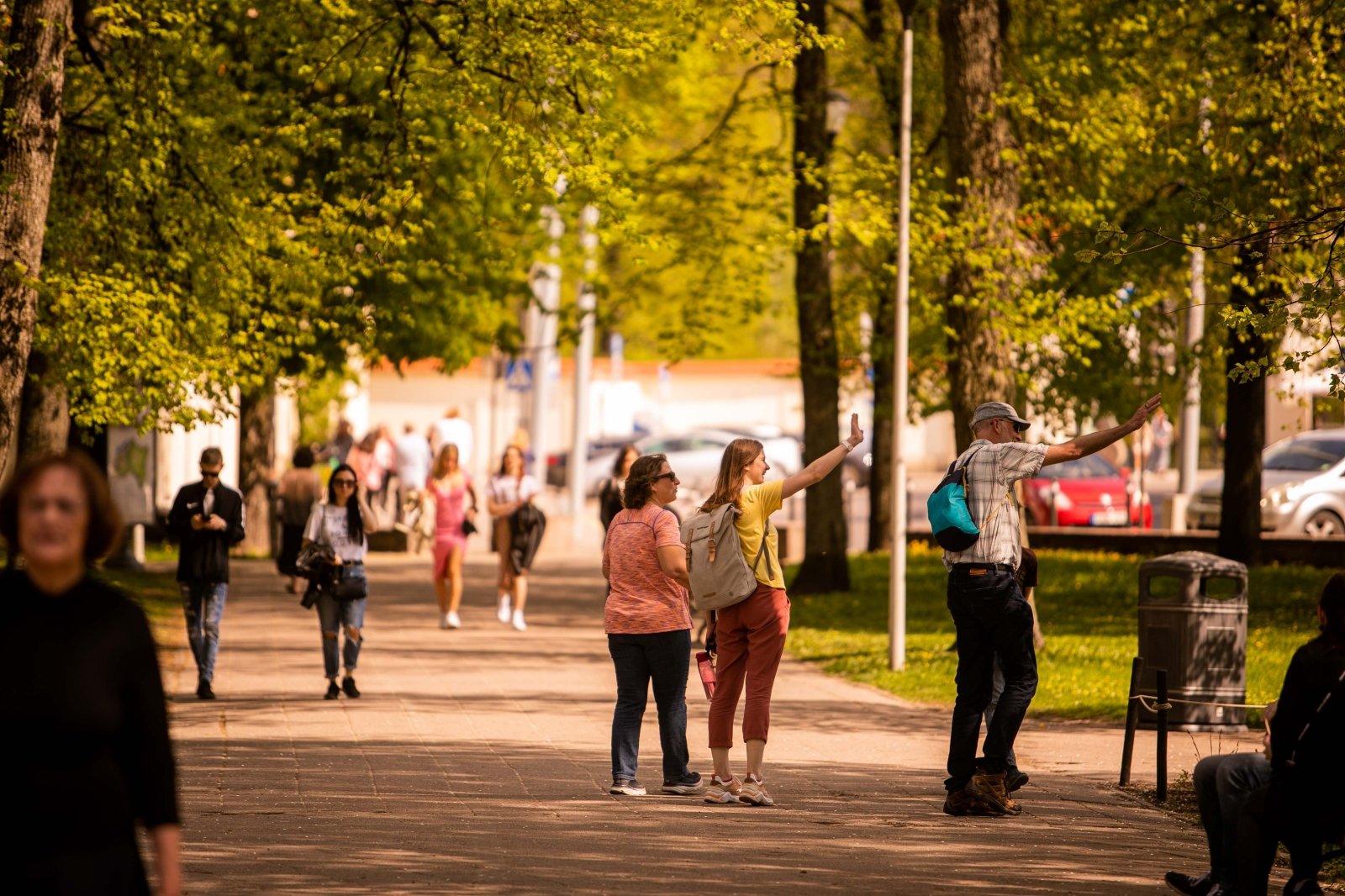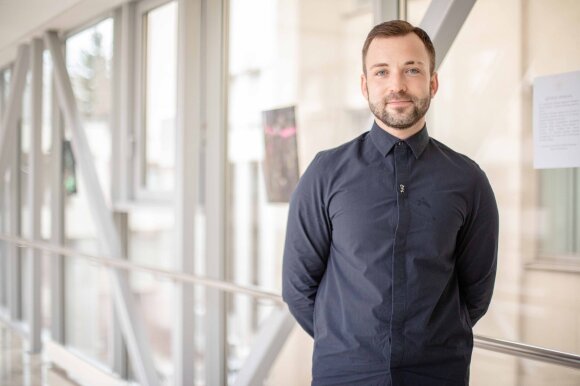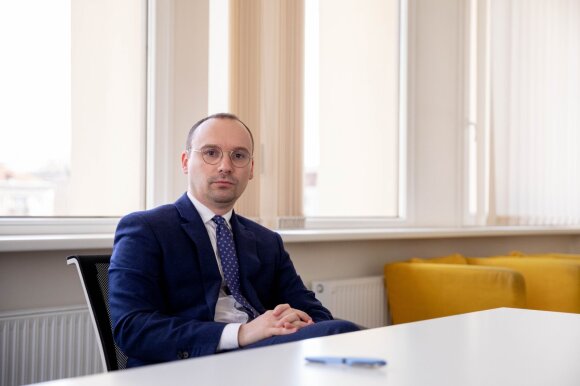
[ad_1]
However, they do not understand why it is necessary to pass the exams in the state language and the fundamentals of the Constitution to obtain a permanent permit. “After all, I am not seeking citizenship,” Yaoyu said.
Helped by spouses or workplace
Yaoyu came to Lithuania 8 years ago. She said that a Lithuanian man had helped her to process all the documents for a temporary residence permit.
“So I didn’t even know where to register. Now the process is easier, ”said a woman who works for an international company and is raising two children.
Currently, Yaoyu is already seeking a permanent residence permit in Lithuania, which would no longer need to be renewed every 2 years.
“The system works better, it took less time. The woman I spoke to spoke English”, compared the interlocutor. The only complaint is that the answer will have to wait up to 4 months.
Eileen, who has lived in Lithuania for more than 4 years, remembers that for the first time she would not have survived without the help of her Lithuanian husband, then boyfriend.
“Without the help of a man, it would have been very difficult to obtain a permit. There is a lot of information in Lithuanian,” recalled the interlocutor who came to work in a financial technology (fintech) company.
Eileen noted that in the past, there have been cases on the Department of Immigration website where the information in English was out of date.
“It also happened that once the documents were delivered, I had to go back and bring something else. Simply because the information on the website has not been updated, ”he said.
The Taiwanese woman said that in the future she plans to obtain a permanent residence permit in Lithuania, but for that she will have to pass special exams.
Julie came to Lithuania in 2017, when she received a scholarship to study the Lithuanian language and culture at one of Kaunas University.
“The university helped me get along. It was even easier because my higher education diploma was from the UK. I arrived in October, and I only received my work and residence permit in January ”, said the interlocutor.
She recalled that in Kaunas she had heard from the Migration Department that she was the first Taiwanese to apply for a visa.
“It just came to our attention then. By the way, in the first year I lived legally in Lithuania, but I didn’t have access to medical care, I couldn’t open a bank account.
Then I started working in the private sector, in a private school. Only then did I get an ID that I could use to address health and financial issues, ”Julie said.
He said that a few years ago, the Migration Department was faced with things like sending from one institution to another, information only in Lithuanian or Russian, etc.
“And now that I had to renew my residence permit, everything was in cyberspace and much clearer,” said the Taiwanese.
Julie said that she is currently considering PhD studies in Kaunas, then she could already apply for a permanent residence permit in Lithuania.
“As for the exams, as far as I know, you can prepare for them in the same way as for the driving test,” said the interviewee.

Look for highly qualified professionals
Loreta Tumalavičienė, chief specialist of the Migration Department, told Delfi that the changes mentioned by the Taiwanese are the result of several years of constant work.
“In 2019, after the transformation of migration functions (merging the migration services of the territorial police with the Department of Migration), the Department of Migration became a responsible state institution with a network of territorial units that provide services migration throughout Lithuania (53 customer service units in total).
One of the strategic objectives of the Migration Department is to create high-quality, customer-oriented and value-added services by attracting highly qualified specialists and foreign investment to Lithuania.
After assessing customer needs, the Migration Department streamlined migration processes, implemented a unified customer service standard, established a call, phone and email center. Consulting in Lithuanian, English and Russian on all migration issues, working hard to improve customer service spaces and expand the range of electronic services.
At present, almost all the services provided by the Migration Department have been transferred to the electronic space (MIGRIS) and customer flows have been managed. At the same time, the Migration Department pays close attention to training staff in customer service, conflict management, decision-making, carefully analyzes the comments received and, if necessary, improves its internal procedures or makes proposals to the Ministry of the Inside. to change the legal regulation of immigration procedures, “he said.
L. Tumalavičienė added that a new service will be introduced to customers this month: e. a resident card, which will give foreign citizens the opportunity to use electronic services provided by Lithuanian institutions.
A representative from the Migration Department also responded due to the long waiting period of 4 months.
“This is the maximum period for processing applications for a residence permit in Lithuania. This period depends on the basis of the application submitted by the foreigner (business, work, education, studies, family reunification, etc.) and on the documents presented, which require additional actions: contact and interview the client, consult other institutions and receive their answers or conclusions, etc.
Sometimes it is necessary to wait until the company that employs the foreigner pays debts or arrears with the state budget or until the client presents the missing documents to the department. The Migration Department constantly monitors and analyzes the deadlines for processing requests, constantly reviews internal procedures and eliminates the causes of bottlenecks, which means that requests are processed more quickly.
Information on the average deadlines for processing applications is published monthly on the website of the Department of Migration. In May, the average duration of processing applications based on businesses was 46 days, based on work – 45 days, based on highly qualified professional work – 35 days, based on studies – 26 days “, He said. .

Most exams pass
Yaoyu, who is seeking a permanent residence permit in Lithuania, has already passed both the state language and the basic constitutional exams.
“I understand the language, but not the Constitution. I have been here for 8 years, I have two children. Why do I have to take that exam? After all, I am not looking for citizenship”, considered the interlocutor.
Yaoyu said that the language test was not difficult for her. The Constitution calls for more efforts.
“Although I study a lot myself, reading the Constitution is definitely not easy, there are many words that are not used every day. However, in the exam itself, I realized that it is not very difficult because the questions are public. If you remember them, it can hold. I spent a lot of time on it, maybe I could have done less, but I just wanted to be ready, “Yaoyu said.
According to the statistics of the National Education Agency, which organizes these exams, the majority pass them. In 2020, 84% passed both the State Language Proficiency Category I and the Constitutional Foundations Exam. those who held it.
L. Tumalavičienė recalled that these examinations are performed by foreigners seeking a permanent residence permit in Lithuania because they have resided legally in Lithuania for 5 years without interruption or have resided in a Member State of the European Union without interruption for the last 5 years, of which at least 2 years in Lithuania.
“It is not necessary to take the examination of State Language and Fundamentals of the Constitution of the Republic of Lithuania in cases where people older than 75 years, disabled people of group I, people with special needs, as well as people with severe chronic mental illnesses and behavioral disorders apply for a permanent residence permit for the specified reasons: people, children.
These exams are carried out in order to encourage foreigners to learn the state language and improve the conditions for their social adaptation and integration into society ”, he said.

Tomas Vytautas Raskevičius
© DELFI / Josvydas Elinskas
Talk about systemic change
Tomas Vytautas Raskevičius, chairman of the Seimas Human Rights Committee, said that when it comes to broader systemic changes in the field of migration policy, additional attention should be paid to several areas.
“(A) review the procedures for hiring foreigners and waive excessive requirements that hinder the development of transparent businesses; b) review the legal provisions governing the right of third-country nationals to family reunification and waive unjustified and disproportionate restrictions, thus facilitating their conditions of residence in Lithuania; (c) take preventive measures to prevent economic exploitation of migrants; (d) adopt and implement a national migration policy, emphasizing not only the economic benefits but also the opportunities offered by cultural pluralism, ”he said.
The Deputy Elder of the Liberty Faction pointed out that the Seimas is considering projects of the Investment Law, the Law of the Legal Status of Foreigners and the Employment Law, which aim to facilitate the transfer of all or part of company employees to the Republic of Lithuania.
“These changes have been initiated by the Ministry of Economy and Innovation and the project’s objectives are in line with my priorities (a) and (b) mentioned above,” he added.
With regard to state language examinations and the foundations of the Constitution, in the opinion of TV Raskevičius, such requirements in the context of migration should be applied proportionally.
“For example, to acquire citizenship of the Republic of Lithuania. Feedback from those covered by these requirements is also important. In other words, it is important that the requirement to pass certain exams does not become an insurmountable obstacle to living and working in Lithuania, ”the Seimas member summarized.

© DELFI / Josvydas Elinskas
Matas Maldeikis, chairman of the Taiwan parliamentary relations group, said that if a person really has an interest in living permanently in Lithuania, then the minimum requirements to understand its constitutional structure and the basics of the state language are a good solution.
“It is a matter of respect for the country you come to, respect for its citizens and respect for yourself,” he said.
It is strictly forbidden to use the information published by DELFI on other websites, in the media or elsewhere, or to distribute our material in any way without consent, and if consent has been obtained, it is necessary to cite DELFI as the source. .
[ad_2]